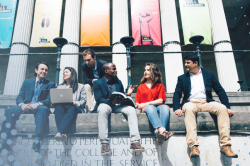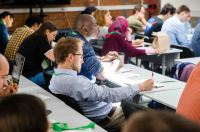What is academic mobility?
Academic mobility programs offer students and lecturers the opportunity to spend some of their time working or studying at a foreign university or research center. The average term length of such programs is one semester. In general, ITMO conducts academic mobility programs with its partner universities; most of such programs are in English, yet some universities in France and Germany offer programs in their national languages.
All the grades and ECTS credits you'll get at a partner university will be "transferred" back to ITMO, so you won't have any academic deficiencies; a single ECTS credit is equated to 36 Russian academic hours, and the grades are transferred on the basis of a Transcript of Records or a similar document sent to ITMO's International office.

Where to go?
Each semester, ITMO's International Office publishes the list of universities recommended for exchange education; also, there's a list of partner universities on ITMO's website. Each semester, several universities are chosen to conduct exchange programs with.
What about expenses?
You'll have to spend quite a lot on accommodation; most likely, you'll be given a choice between a place in the dorms or a student apartment. In some of Finland's universities, the rent is included in the cost of the program, but in most cases you'll have to pay for it yourself. Still, ITMO has special scholarships that can help you with that.

What does one have to do to participate in an exchange program at a partner university?
1. First of all, you have to decide on what you really want. If you aren't sure, keep trying.
2. Choose a partner university. That won't be easy: you'll have to go through the whole list, read about their program tracks, and find out whether they have programs in English at the time you are planning to go there. Most European universities' websites have an Exchange Students section, be sure to look for it.
3. Get approval for participation in an exchange program from your Department Head or scientific advisor. It is most important to avoid ending up with several academic deficiencies (or worse).
4. Choose a program. It’s likely that you won't be able to find a program identical to the one you're pursuing at ITMO. Many courses will have different names, but be similar in content. What is more, the system allows each student to decide on an individual educational path; your Department Head can help you can develop a study plan which will allow you to transfer most grades you've received during your exchange studies back to ITMO University.
5. Apply for an academic mobility program. You'll need to submit your CV, a motivational letter and some document to substantiate your language skills (an international certificate or the results of tests conducted at ITMO University), and then pass an interview in the language you'll be taking your program in.
Other options for studying abroad
Double Degree Master's programs
As part of your education on a Double Degree Master's program, you'll be spending a year at a particular partner university (which you won't be able to choose). As result, you'll be graduating with diplomas of both.

Internships
There are many types of short-term academic mobility programs: workshops, summer and winter schools, conferences and the like; all of those take no more than a month (one or two weeks on the average).
To take part in one of these, you can apply for compensation of 70% of the travel expenses (no more than 30,000 rubles) after getting confirmation that you've been accepted for such a program. Your chances of getting the compensation increase if you are planning to actively participate in the event (present a report, organize a round table, etc.). You also need to specify the source of co-financing of your trip (the remaining 30% - your or your parents/legal guardians' funds, financing from your department, international research laboratory, company, etc.), as well as some document to substantiate your language skills.

Short-term internships for PhD students
These are mostly conferences, or anything that has to do with a PhD student's research activities. The financing terms are mostly the same, yet the University can compensate up to 50,000 rubles; naturally, you still have to provide some document or pass ITMO's internal test to substantiate your command of a foreign language.
And now, some life-hacks from the recent exchange students:
Daria Sankova, spent a year at ESIEE Paris (France)
 Daria Sankova
Daria Sankova
1. Don’t listen to anyone. Don’t rely on others’ experiences - yours will be unique.
2. If you’re going to France, don’t get tickets on Monday - in France, it is an official holiday, same as Saturday or Sunday.
3. Don’t worry about not knowing a country’s national language. You can always find help in English, or just speak in signs.
4. Be ready to face a different mentality. You yourself might change as well: start to smile more, become less rough and ready, and more flexible; you’ll likely learn new means of communication that will prove most useful whereever you are.
5. Life won’t be cheap, but that depends on you. You’ll have to reconsider your attitude towards money.
6. You’ll make friends from all around the world. And you’ll be able to count on them.
7. There won’t be any convenience stores. Everything closes early, but you’ll get used to it.
8. You’ll have to study a lot, but, if you’re good at time-management, you’ll have time to rest too.
Anton Suhinets, spent a semester at ESIEE Paris (France)
 Anton Suhinets
Anton Suhinets
1. Plan your expenses thoroughly. Learn the costs for accommodation beforehand (they can be quite high).
2. Be careful with your individual study plan. You’d better coordinate it with your Department Head, so as to avoid academic deficiencies.
3. Buy return tickets in advance. Tickets can be very expensive during the tourist season.
4. It can turn out that some of the subjects you’ll have to attend have already started during the previous semester. Be sure to check with the university’s website - sometimes, you’ll have to catch up.
5. Almost every university gives scholarships that cover accommodation costs; those can be a great help.
Ekaterina Krylova, a semester at the University of Liège
 Ekaterina Krylova
Ekaterina Krylova
1. Find out which part of Belgium you’ll be living in. In Wallonia, they only speak French (yet, you can sign up for a language course at the university), yet in the Flemish Region English is very widespread.
2. Exchange students have the right to attend any lectures for their program track for two weeks, and then choose the ones they’ve liked most. Yet, many lecturers set some qualification requirements (like taking a course in advanced mathematics or making a motivational speech).
3. In Belgium, time management is most important. There are two temptations you’ll be facing - travelling and parties. Liege is the center of the student movement, so there are lots of opportunities to have fun.
4. In Belgium, they have long holidays each semester - two and a half weeks long. This is a good time for travelling.
5. Be ready for strict exams. There are three types of them: written, oral and alternative (a case). For each wrong answer you get penalties, so it is better to not answer if you aren’t sure you got it right.
6. If you experience any problems, you can always approach ITMO’s International Office in Brussels, which is some 40 minutes from Liege.





